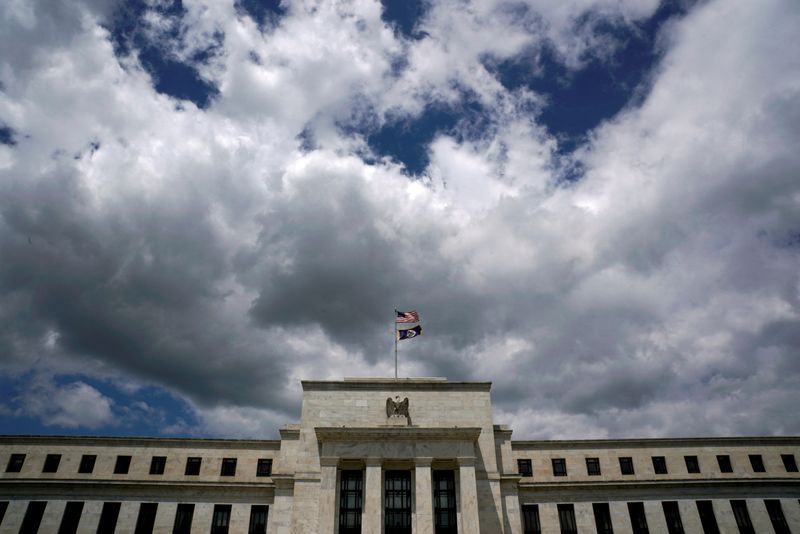By Pete Schroeder
WASHINGTON (Reuters) - U.S. bank investors, analysts and executives were trying to figure out on Wednesday how lenders would fare under revised hikes in capital requirements, with considerable uncertainty over what specifics will emerge from the Federal Reserve and other regulators, and the presidential election a looming wild card.
The Fed's regulatory chief Michael Barr on Tuesday outlined a plan to raise big bank capital by 9%, easing an earlier proposal to hike capital 19%. It was a major concession to Wall Street banks that had lobbied to water down the "Basel" draft.
The central bank is expected to publish the new version and start taking on industry feedback in coming weeks.
Despite the apparent industry victory, analysts, executives and two regulatory sources said the plan was still mired in uncertainty, with key details unclear and the Nov. 5 election casting doubt over whether it would survive a new administration.
Speaking at the Brookings Institution, a Washington think tank, Barr said on Tuesday he was not rushing to finalize the rules before the election. Vice President Kamala Harris, the Democratic candidate, has called for strong bank rules, while Republican candidate Donald Trump has pledged to cut red tape.
If he won, Trump could quickly appoint Republican officials at the banking agencies who could shelve the entire plan, while a Harris administration would almost certainly finalize -- if not strengthen it, analysts and industry officials have said.
"The future of this proposal is very closely tied to the presidential election," said Ian Katz, managing director of policy research firm Capital Alpha Partners. "A Basel agreement might be possible under Republican regulators, but it would look different and almost surely be easier on the banks."
The revised plan failed to buoy bank stocks on Tuesday, with the S&P 500 banking index closing down 2.88% on worries over economic growth, the trajectory of Fed interest rate cuts, and banks' earnings outlook.
"The new capital requirements are measurably lower than initially proposed. [That] should improve some thinking around better earnings growth, but all of that energy is getting sucked away," Brian Mulberry, portfolio manager at Zacks Investment Management which holds several bank stocks, wrote in an email.
In public campaigns and conversations with Washington lawmakers and regulators, Wall Street banks have argued more capital reserves are unnecessary and will hurt the economy. They have threatened to sue to kill the final rule on grounds the U.S. central bank and other agencies did not follow the proper procedure.
In response, Fed Chair Jerome Powell said this summer that regulators will make "material" changes, and that the new draft should be re-proposed for public feedback. Fed officials have been at loggerheads with their counterparts at the Office of the Comptroller of the Currency (OCC) and the Federal Deposit Insurance Corporation (FDIC), who have wanted to finalize the rule before the election, Reuters reported in June.
While Barr said on Tuesday the Fed board would vote for his revised plan, it remained unclear if the OCC and FDIC would do the same. In separate statements, FDIC Chairman Martin Gruenberg and acting Comptroller Michael Hsu said Barr's plan reflects their joint work revising the proposal, and both were committed to ensuring the work is completed. They did not lay out how they would proceed.
Jonathan McKernan, a Republican member of the FDIC board, told Reuters he would not vote for Barr's plan because it did not go far enough to fix all the problems. A confused or unconventional roll out of the proposal would make the final rule vulnerable to litigation, lawyers have said.
"Likely legal challenges and the post-election timeline for finalization" makes the future of the rule uncertain, wrote Ed Mills, an analyst with Raymond James. Still, he said "the proposals outlined today should be viewed as a material positive for the banking sector."
In a sign of that uncertainty and the sizeable capital hikes banks still face, industry groups did not claim victory on Tuesday. Most said they would study the new draft once it is published. They have spent a year fighting the Fed over the fine print of the rule, and have argued that the central bank has dramatically understated its capital burden on big lenders.

Barr laid out broad changes in how the new draft would measure banks' credit, market and operational risks, but executives and regulatory sources said the precise language would dictate which banks would win or lose, which will depend on each bank's business model.
"The devil will be in the details for this proposal, and we will need to see the actual proposal before making any final assessment as to the impact," said Mills.